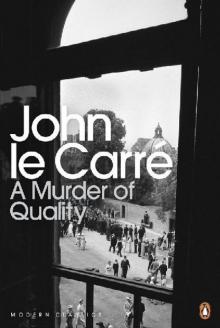- Home
- John le Carré
A Small Town in Germany Page 9
A Small Town in Germany Read online
Page 9
‘You mean he is.’
‘I have never yet caught him in a lie. Having decided to leave, he seems to have taken what was owing to him and no more.’
‘Some people would call that honourable.’
‘Not to steal? I would call that a negative achievement. He might also know, from his knowledge of the law, that an act of theft would have justified an approach to the German police.’
‘Christ,’ said Turner, watching him, ‘you won’t even give him marks for conduct.’
Miss Peate, Bradfield’s personal assistant, brought coffee. She was a middle-aged, under-decorated woman, stitched taut and full of disapproval. She seemed to know already where Turner came from, for she cast him a look of sovereign contempt. It was his shoes, he noticed to his pleasure, that she most objected to; and he thought: bloody good, that’s what shoes are for.
Bradfield continued: ‘Rhine Army withdrew at short notice and he was left without a job. That was the nub of it.’
‘And without access to Nato military intelligence? That’s what you’re telling me.’
‘That is my hypothesis.’
‘Ah,’ said Turner, affecting enlightenment, and wrote laboriously in his notebook hypothesis as if the very word were an addition to his vocabulary.
‘On the day Rhine Army left, Harting came to see me. That was eighteen months ago, near enough.’
He fell silent, struck by his own recollection.
‘He is so trivial,’ he said at last, in a moment of quite uncharacteristic softness. ‘Can’t you understand that? So utterly lightweight.’ It seemed to surprise him still. ‘It’s easy to lose sight of now: the sheer insignificance of him.’
‘He never will be again,’ Turner said carelessly. ‘You might as well get used to it.’
‘He walked in; he looked pale, that was all; otherwise quite unchanged. He sat down in that chair over there. That is his cushion, by the way.’ He permitted himself a small, unloving smile. ‘The cushion was a territorial claim. He was the only member of Chancery who reserved his seat.’
‘And the only one who might lose it. Who embroidered it?’
‘I really have no idea.’
‘Did he have a housekeeper?’
‘Not to my knowledge.’
‘All right.’
‘He didn’t say anything at all about his altered situation. They were actually listening to the radio broadcast in Registry, I remember. The regiments were being piped on to the trains.’
‘Quite a moment for him, that.’
‘I suppose it was. I asked him what I could do for him. Well, he said, he wanted to be useful. It was all very low-key, all very delicate. He’d noticed Miles Gaveston was under strain, what with the Berlin disturbances and the Hanover students and various other pressures: might he not help out? I pointed out to him he was not qualified to handle internal matters; they were the preserve of regular members of Chancery. No, he said, that wasn’t what he meant at all. He wouldn’t for a minute presume to trespass upon our major effort. But he had been thinking: Gaveston had one or two little jobs; could he not take them over? He had in mind for instance the Anglo-German Society, which was pretty well dormant by then but still entailed a certain amount of low-level correspondence. Then there was Missing Persons: might he not take over a few things of that kind in order to disencumber the busier Chancery Officers? It made some sense, I had to admit.’
‘So you said yes.’
‘I agreed to it. On a purely provisional basis, of course. An interim arrangement. I assumed we would give him notice in December when his contract ran out; until then, he could fill in his time with whatever small jobs he could find. That was the thin end of the wedge. I was no doubt foolish to listen to him.’
‘I didn’t say that.’
‘You don’t have to. I gave him an inch; he took the rest. Within a month he had gathered them all in; all the end-clippings of Chancery work, all the dross a big Embassy attracts: Missing Persons, Petitions to the Queen, Unannounced Visitors, Official Tours, the Anglo-German Society, letters of abuse, threats, all the things that should never have come to Chancery in the first place. By the same token, he spread his talents across the social field as well. Chapel, the choir, the Catering Committee, the Sports Committee. He even started up a National Savings group. At some point he asked to be allowed to use the title “Consular” and I consented. We have no Consular duties here, you understand; that all goes up to Cologne.’ He shrugged. ‘By December he had made himself useful. His contract was brought forward’ – he had taken up his fountain pen and was again staring at the nib – ‘and I renewed it. I gave him another year.’
‘You treated him well,’ Turner said, his eyes all the time upon Bradfield. ‘You were quite kind to him really.’
‘He had no standing here, no security. He was already on the doorstep and he knew it. I suppose that plays a part. We are more inclined to care for the people we can easily get rid of.’
‘You were sorry for him. Why won’t you admit it? It’s a fair enough reason, for God’s sake.’
‘Yes. Yes I suppose I was. That first time, I was actually sorry for him.’ He was smiling, but only at his own stupidity.
‘Did he do the work well?’
‘He was unorthodox, but not ineffectual. He preferred the telephone to the written word, but that was only natural; he had had no proper instruction in drafting. English was not his native language.’ He shrugged. ‘I gave him another year,’ he said again.
‘Which expired last December. Like a licence really. A licence to work; to be one of us.’ He continued to watch Bradfield. ‘A licence to spy. And you renewed it a second time.’
‘Yes.’
‘Why?’
Once more Turner was aware of that hesitation which seemed to signify concealment.
‘You weren’t sorry for him, were you? Not this time?’
‘My feelings are irrelevant.’ He put down the pen with a snap. ‘The reasons for keeping him on were totally objective.’
‘I didn’t say they weren’t. But you can still be sorry for him.’
‘We were understaffed and overworked. The Inspectors had already reduced us by two against my most strenuous advice. The allowances had been halved. Not just Europe was in flux. There were no constants anywhere any more. Rhodesia, Hong Kong, Cyprus … British troops were running from one to the other trying to stamp out a forest fire. We were half-way into Europe and half-way out again. There was talk of a Nordic Federation; God knows what fool gave birth to that idea!’ Bradfield declared with utter contempt. ‘We were putting out feelers in Warsaw, Copenhagen and Moscow. One minute we were conspiring against the French, the next we were conspiring with them. While that was going on we found the energy to scrap three-quarters of the Navy and nine-tenths of our independent deterrent. It was our worst time; our most humiliating time, and our busiest. To crown everything, Karfeld had just taken over the Movement.’
‘So Harting took you through the act again.’
‘Not the same act.’
‘What do you mean?’
A pause.
‘It had more purpose. It had more urgency. I felt it and I did nothing about it. I blame myself. I was conscious of a new mood in him and I did not pursue it.’ He continued: ‘At the time I put it down to the general state of intensity in which we were all living. I realise now that he was playing his biggest card.’
‘Well?’
‘He began by saying he still didn’t feel he was pulling his weight. He had had a good year, but he felt he could do more. These were bad days; he would like to feel he was really helping to get things on an even keel. I asked him what he had in mind; I thought he’d just about swept the board by then. He said, well, it was December – that was the nearest he ever came to referring to his contract – and he had naturally been wondering about the Personalities Survey.’
‘The what?’
‘Biographies of prominent figures in German life. Our own confident
ial Who’s Who. We prepare it every year, each of us takes a hand and contributes something on the German personalities with whom he deals. The Commercial people write about their commercial contacts, the Economists about the economists, the Attachés, Press, Information, they all add their bit. Much of the material is highly unflattering; some of it is derived from secret sources.’
‘And Chancery edits?’
‘Yes. Once again he had chosen very accurately. It was another of those chores which interfered with our proper duties. It was already overdue. De Lisle, who should have compiled it, was in Berlin; it was becoming a confounded nuisance.’
‘So you gave him the job.’
‘On a provisional basis, yes.’
‘Until the next December, for instance?’
‘For instance. It is easy now to think of reasons why he wanted that particular job. The survey provided him with a laissez-passer to any part of the Embassy. It runs across the board; it covers the whole range of Federal affairs: industrial, military, administrative. Once charged with the survey, he could call on whomever he liked without questions being asked. He could draw files from any other Registry: Commercial, Economic, Naval, Military, Defence – they all opened their doors to him.’
‘And the question of vetting never crossed your mind?’
The self-critical note returned: ‘Never.’
‘Well, we all have our moments,’ said Turner quietly. ‘And that’s how he got his access?’
‘There’s more to it than that.’
‘More? That’s just about the lot, isn’t it?’
‘We not only have archives here; we have a Destruction programme as well. It has been running for years. The purpose is to keep Registry space available for new files and to get rid of old ones we no longer need. It sounds a somewhat academic project and in many ways it is; nevertheless, it happens to be vital. There is a clearly defined economic limit to the amount of paper Registry can handle, and to the amount of paper it will hold. The problem is akin to that of road traffic: we are constantly creating more paper than we can digest. Very naturally, it was another of those jobs we took up and put down as time allowed; it was also an absolute curse. For a while it would be forgotten; then the Office would write and ask for our latest figures.’ He shrugged. ‘As I say, it’s very simple. We can’t go on indefinitely, even in a place this size, building up more files than we destroy. Registry’s bursting at the seams already.’
‘So Harting proposed himself for the task.’
‘Precisely.’
‘And you agreed.’
‘On a provisional basis. He should try his hand and see how it went. He has been working at it off and on for five months. When in doubt, I told him, he was to consult de Lisle. He never did so.’
‘Where did he actually do this work? In his room?’
Bradfield barely hesitated. ‘In Chancery Registry, where the most sensitive documents are kept. He had the run of the strong-room. He could draw whatever he wanted provided he didn’t overplay his hand. There isn’t even any record of what he did look at. There are also some letters missing; the Registrar will give you the details.’
Slowly Turner stood up, brushing his hands together as if they had sand on them.
‘Of the forty-odd missing files, eighteen are drawn from the Personality Survey and contain the most sensitive material on high-ranking German politicians. A careful reading would point clearly to our most delicate sources. The rest are Top Secret and cover Anglo-German agreements on a variety of subjects: secret treaties, secret codicils to published agreements. If he wished to embarrass us, he could hardly have chosen better. Some of the files go right back to forty-eight or -nine.’
‘And the one special file? “Conversations Formal and Informal”?’
‘Is what we call a Green. It is subject to special procedures.’
‘How many Greens are there in the Embassy?’
‘This is the only one. It was in its place in Registry strong-room on Thursday morning. The Registrar noticed its absence on Thursday evening and assumed it was in operation. By Saturday morning he was deeply concerned. On Sunday he reported the loss to me.’
‘Tell me,’ said Turner at last. ‘What happened to him during last year? What happened between the two Decembers? Apart from Karfeld.’
‘Nothing specific.’
‘Then why did you go off him?’
‘I didn’t,’ Bradfield replied with contempt. ‘Since I never had any feeling for him either way, the question does not arise. I merely learnt during the intervening year to recognise his technique. I saw how he operated on people; how he wheedled his way in. I saw through him, that’s all.’
Turner stared at him.
‘And what did you see?’
Bradfield’s voice was as crisp and as finite and as irreducible as a mathematical formula. ‘Deceit. I’d have thought I had made that plain by now.’
Turner got up.
‘I’ll begin with his room,’ he said.
‘The Chancery Guard has the keys. They’re expecting you. Ask for Macmullen.’
‘I want to see his house, his friends, his neighbours; if necessary I’ll talk to his foreign contacts. I’ll break whatever eggs I’ve got to, no more no less. If you don’t like it, tell the Ambassador. Who’s the Registrar?’
‘Meadowes.’
‘Arthur Meadowes?’
‘I believe so.’
Something held him back: a reluctance, a hint of uncertainty, almost of dependence, a middle tone quite out of character with anything that had gone before.
‘Meadowes was in Warsaw, wasn’t he?’
‘That’s correct.’
Louder now: ‘And Meadowes has a list of the missing files, has he?’
‘And letters.’
‘And Harting worked for him, of course.’
‘Of course. He is expecting you to call on him.’
‘I’ll see his room first.’ It was a resolution he seemed to have reached already.
‘As you wish. You mentioned you would also visit his house –’
‘Well?’
‘I am afraid that at present it is not possible. It is under police protection since yesterday.’
‘Is that general?’
‘What?’
‘The police protection?’
‘Siebkron insists upon it. I cannot quarrel with him now.’
‘It applies to all hirings?’
‘Principally the more senior ones. I imagine they have included Harting’s because it is remote.’
‘You don’t sound convinced.’
‘I cannot think of any other reason.’
‘What about Iron Curtain Embassies; did Harting hang around them at all?’
‘He went to the Russians occasionally; I cannot say how often.’
‘This man Praschko, the friend he had, the politician. You said he used to be a fellow-traveller.’
‘That was fifteen years ago.’
‘And when did the association end?’
‘It’s on the file. About five years ago.’
‘That’s when he had the fight in Cologne. Perhaps it was with Praschko.’
‘Anything is possible.’
‘One more question.’
‘Well?’
‘That contract he had. If it had expired … say last Thursday?’
‘Well?’
‘Would you have renewed it? Again?’
‘We are under great strain. Yes, I would have renewed it.’
‘You must miss him.’
The door was opened from the outside by de Lisle. His gentle features were drawn and solemn.
‘Ludwig Siebkron rang; the exchange had orders not to put through your calls. I spoke to him myself.’
‘Well?’
‘About the librarian, Eich: the wretched woman they beat up in Hanover.’
‘About her?’
‘I’m afraid she died an hour ago.’
Bradfield considered this intellig
ence in silence. ‘Find out where the funeral is. The Ambassador must make a gesture; a telegram to the dependants rather than flowers. Nothing too conspicuous; just his deepest sympathy. Talk to them in Private Office, they’ll know the wording. And something from the Anglo-German Society. You’d better handle that yourself. And send a cable to the Association of Assistant Librarians; they were enquiring about her. And ring Hazel, will you, and tell her? She asked particularly to be kept informed.’
He was poised and perfectly in control. ‘If you require anything,’ he added to Turner, ‘tell de Lisle.’
Turner was watching him.
‘Otherwise we shall expect you tomorrow night. About five to eight? Germans are very punctual. It is the local custom that we assemble before they arrive. And if you’re going down to his room, perhaps you would take that cushion. I see no point in our having it up here.’
Albino Cork, stooped over the cypher machines while he coaxed the strips of print from the rollers, heard the thud and turned his pink eyes sharply towards the large figure in the doorway.
‘That’s my bag. Leave it where it is; I’ll be in later.’
‘Righty-ho,’ said Cork and thought: a Funny. Just his luck, with the whole ruddy world blowing up in his face, and Janet’s baby due any minute, and that poor woman in Hanover turning up her toes, to be landed with a Funny in the dayroom. This was not his only grudge. The German steel strike was spreading nicely; if he had only thought of it on Friday and not Saturday, that little flutter on Swedish steel would have shown a four-bob capital profit in three days; and five per cent per day, in Cork’s losing battle with clerical status, was what villas in the Adriatic were made of. Top Secret, he read wearily, Personal for Bradfield and Decypher Yourself: how much longer will that go on? Capri … Crete … Spetsai … Elba … Give me an island to myself, he sang, in a high-pitched pop improvisation – for Cork had dreams of cutting his own discs as well – Give me an Island to myself, Any Island, Any Island but Bonn.
5
John Gaunt

 The Honorable Schoolboy
The Honorable Schoolboy The Pigeon Tunnel: Stories From My Life
The Pigeon Tunnel: Stories From My Life Single & Single
Single & Single The Spy Who Came in From the Cold
The Spy Who Came in From the Cold The Looking Glass War
The Looking Glass War The Night Manager
The Night Manager A Delicate Truth
A Delicate Truth A Perfect Spy
A Perfect Spy The Little Drummer Girl
The Little Drummer Girl Absolute Friends
Absolute Friends A Murder of Quality AND Call for the Dead
A Murder of Quality AND Call for the Dead The Russia House
The Russia House The Tailor of Panama
The Tailor of Panama Tinker, Tailor, Soldier, Spy
Tinker, Tailor, Soldier, Spy A Legacy of Spies
A Legacy of Spies The Mission Song
The Mission Song A Most Wanted Man
A Most Wanted Man John Le Carré: Three Complete Novels
John Le Carré: Three Complete Novels The Secret Pilgrim
The Secret Pilgrim A Small Town in Germany
A Small Town in Germany A Murder of Quality
A Murder of Quality Smiley's People
Smiley's People Agent Running in the Field
Agent Running in the Field The Spy Who Came in from the Cold s-3
The Spy Who Came in from the Cold s-3 The Pigeon Tunnel
The Pigeon Tunnel The Russia House - 13
The Russia House - 13 The Honourable Schoolboy
The Honourable Schoolboy Call For The Dead s-1
Call For The Dead s-1 Call for the Dead
Call for the Dead Call for the Dead - 1
Call for the Dead - 1